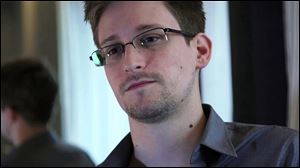
WORSE THAN SNOWDEN CASE
Leak of plot hurt NSA, officials say
Al-Qaeda has switched to unmonitored channel
9/30/2013
The impact of a leaked al-Qaeda terrorist plot in August has caused more immediate damage to U.S. counterterrorism efforts than the thousands of classified documents disclosed by Edward Snowden, the former National Security Agency contractor, government analysts and U.S. officials said.
WASHINGTON — The impact of a leaked al-Qaeda terrorist plot in August has caused more immediate damage to U.S. counterterrorism efforts than the thousands of classified documents disclosed by Edward Snowden, the former National Security Agency contractor, government analysts and U.S. officials said.
Since news reports in early August revealed the United States intercepted messages between al-Qaeda leader Ayman al-Zawahri and the head of the Yemen-based al-Qaeda in the Arabian Peninsula talking of an imminent terrorist attack, analysts have detected a sharp drop in the terrorists’ use of a major communications channel that authorities monitored.
Since August, U.S. officials have scrambled to find new ways to tap into the electronic messages and conversations of al-Qaeda’s leaders and operatives.
“The switches weren’t turned off, but there has been a real decrease in quality” of communications, said one U.S. official, who like others quoted spoke on the condition of anonymity.
The drop in message traffic after the communication intercepts contrasts with what analysts describe as a more muted impact on counterterrorism efforts from Mr. Snowden’s disclosures of the capabilities of NSA surveillance programs.
Instead of terrorists moving away from electronic communications after those disclosures, analysts have detected terrorists talking mostly about the information Mr. Snowden disclosed.
Senior U.S. officials say Mr. Snowden’s disclosures have had a broader impact on national security in general, including counterterrorism efforts.
This includes fears Russia and China have more technical details about the NSA surveillance programs, as well as concerns about damage to diplomatic ties. Brazilian leader Dilma Rousseff, for example, delayed a state visit to the United States in protest over revelations the agency spied on her, her top aides, and Brazilian oil giant Petrobras.
The communication intercepts between al-Zawahri and Nasser al-Wuhayshi revealed what U.S. intelligence officials and lawmakers have described as one of the most serious plots against U.S. and Western interests since the attacks in 2001. It prompted the closures of 19 U.S. embassies and consulates for a week, when authorities concluded the plot focused on the embassy in Yemen.
In recent months, senior administration officials — including the director of national intelligence, James Clapper, Jr. — have drawn attention to the damage Mr. Snowden’s revelations have done, though most have addressed the impact on national security more broadly, not just the effect on counterterrorism.
U.S. counterterrorism officials say they believe the disclosure about the al-Qaeda plot had a significant impact because it was a specific event that signaled to terrorists that a main communication network the group’s leaders were using was being monitored.
The sharpest decline in messaging has been among the al-Qaeda operatives in Yemen, officials said. The disclosures from Mr. Snowden have not had such specificity about terrorist communications networks, they said.
Other officials offer a dissenting view, saying it is difficult, if not impossible, to separate the impact of the messages between the al-Qaeda leaders from Mr. Snowden’s overall disclosures, and the decline is more likely a combination of the two. “The bad guys are just not going to talk operational planning electronically,” one senior counterterrorism official said.